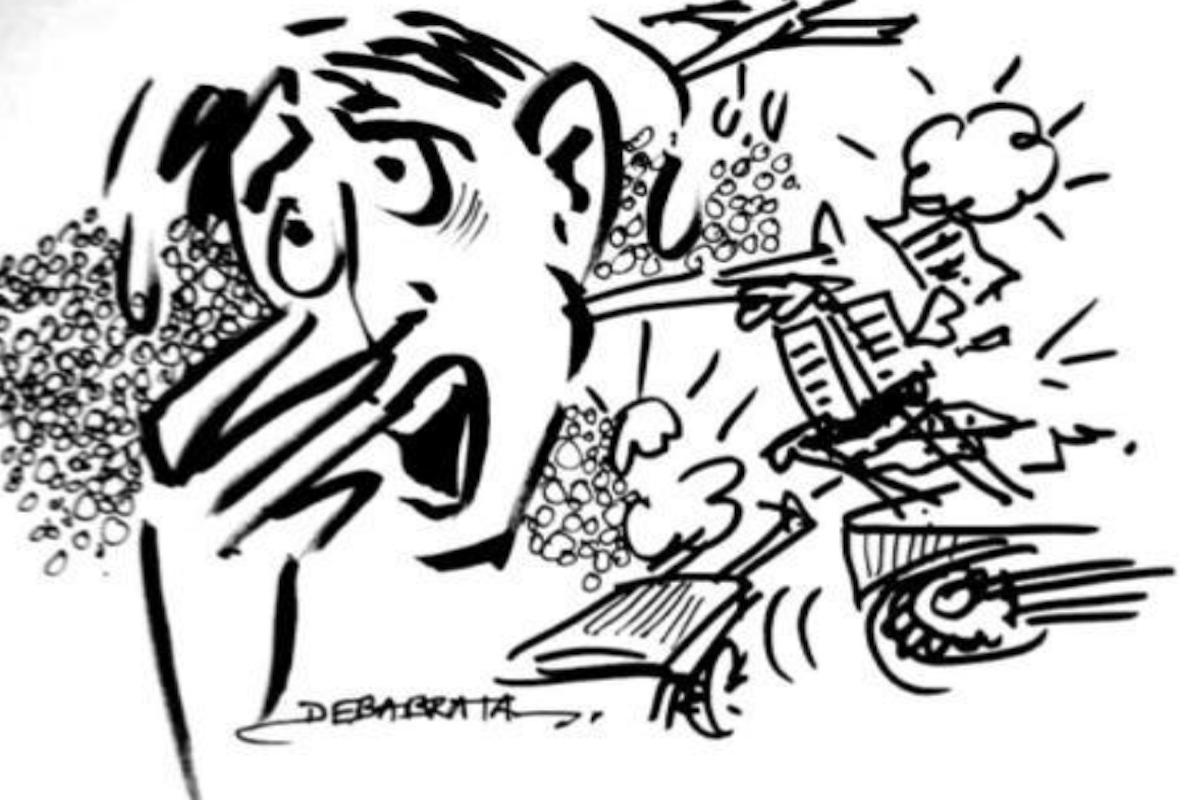VBSY has raised aspirations in common people: Dr. Jitendra Singh
The minister was addressing media persons after participating in Prime Minister Narendra Modi’s virtual interaction with beneficiaries of VBSY.
History – which talks a lot about wars – is full of lies because it is written by the victors.

Illustration:Debabrata Chakrabarty
This is not a political column, and I don’t write here about wars. It is a distasteful subject anyway. Monarchs and masters emerge with glory from battles, but poor soldiers are crushed under their chariots, and women and children and the old and sick die in droves. In the last big war, the British, French and Americans, though they were the main combatants, each lost half a million people, while three million Indians perished.
History – which talks a lot about wars – is full of lies because it is written by the victors. Born in a British colony during the Second World War, I heard how bad the Krauts (Germans) and Japs (Japanese) were. It took me a while to learn the war crimes the Allied powers committed. I have many British friends, but none mentions the war crimes Churchill initiated in Dresden. I am yet to meet an American veteran who recognizes the shameful atrocity Hiroshima represented.
Advertisement
I may not want to write about war, but I cannot avoid talking about my life and yours which have been upended by an unexpected war. Russian tanks had been gathering at Ukraine’s border for weeks, but I expected it to be a show of force rather than its use. So damaging to either side an invasion would be, I thought, it could not happen. But happen it did, defying all expectations of a diplomatic deal or at least an earnest negotiation. Unreason prevailed and the war and killing started.
Advertisement
We live now in a world tightly cuffed by trade and communication. The minuscule flap of a butterfly wing in Brazil, it is said, can cause a massive tornado in Texas. Since Russia is, as the wisecrack goes, a petrol station masquerading as a nation, a huge source of oil and gas, energy prices will skyrocket. Which in turn will raise all prices, particularly the prices of food and consumables that ordinary people mostly need. The economic juggernaut will rout thou- sands as inexorably as Russian missiles and Ukrainian guns.
In time, even more, murderous for common people will be the move toward nationalistic economies and ebbing of world trade. As the war began, MasterCard and Visa, whose credit cards run everywhere, suspended Russian users. No effect, because the Russians had already moved the payment to a Russian agency, which now has a Russian card to boot, Mir. This is the trend. Bigger countries will recede from world trade to safe ‘self-dependence.’ Safe but expensive. The real reason for worldwide commerce is that ordinary people pay less for goods produced cheaply in Malaysia or Madagascar rather than in Italy or England. The first thing the war will do is disrupt or break the supply chain; the next thing, it will raise the price of the commonest goods that common people use. Their life will get harder.
For some people, it will get distinctly harder. We have long ignored global warming and the horrendous consequences of climate change. Most governments have made promises and then reneged on them and clung to fossil fuels. A new UN report says the world is ‘perilously close’ to becoming ‘unlivable,’ with extended heatwaves, flash floods, huge wildfires, long droughts and intense hurricanes. The few steps some governments had taken to control this are liable to be reversed by the sudden cessation of Russian gas and oil and probably return to higher domestic production of fossil fuels. For instance, there is intense lobbying in the US to reverse Biden’s control measures and revamp oil production. This will be disastrous for a series of countries starting with Nigeria, Haiti, Kiribati, Yemen, Myanmar and the Philippines, especially their poorer people.
But the most catastrophic consequence of the war for common people will be the new atmosphere of panic and chaos. That a major power can simply invade a small country, unprovoked, and destroy and kill at will has created an environment where every country wants to strengthen its defence as the highest priority. Germany, long sworn to pacific purposes, has vowed to double its military budget. France, second only to Russia in military power, has advocated a stronger European defence system. Several smaller European countries are reviewing their defence and some Nato countries are out to strengthen themselves quickly. The lesson is not lost on non-Euro- pean countries either, who will allocate more and more of their limited budget to planes and tanks.
War is a nasty affair and the photos of blatant butchery and wanton destruction in Ukraine leave us in little doubt about how evil it is. It is hard to imagine any country securing any political gain from this shoddy episode, but it is even more depressing to consider its social and economic consequences. The poor- er people, not just in Europe but all over the world, will lose substantially in both security and subsistence. The suffering of women and children that we see today will horrendously multiply in the days to come.
We will all suffer from this war, but the improvident will suffer more. Given this reality, it is revolting to find my motherland, itself a longtime victim of big-power colonialism and abysmal poverty, should refuse to name the aggressor of this brutal war and sit on the fence, taking refuge behind hypocritically misconstrued principles once sacrosanct.
Advertisement